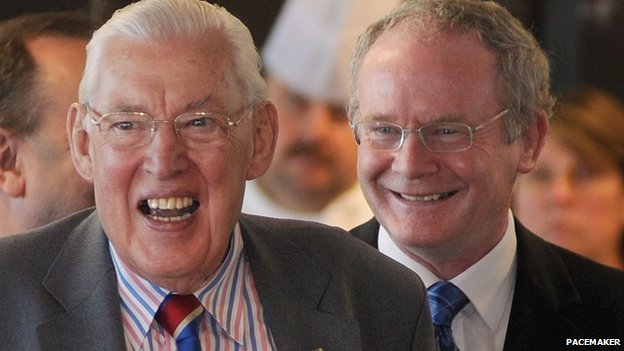In a statement, Baroness Paisley said her husband died on Friday morning.
In a career that spanned nearly 40 years, Mr Paisley moved from a political “never man” to Northern Ireland’s first minister.
He ended up leading a power-sharing executive at Stormont – although he had supported the strike to bring one down 30 years earlier.
In her statement, Baroness Paisley said: “Although ours is the grand hope of reunion, naturally as a family we are heartbroken,” she said.
“We loved him and he adored us, and our earthly lives are forever changed.”
Baroness Paisley said that his funeral would be private.
 Martin McGuinness, Sinn Féin, who was his deputy first minister in the Northern Ireland Assembly, said he had learned of the death with deep regret and sadness.
Martin McGuinness, Sinn Féin, who was his deputy first minister in the Northern Ireland Assembly, said he had learned of the death with deep regret and sadness.
“Over a number of decades we were political opponents and held very different views on many, many issues but the one thing we were absolutely united on was the principle that our people were better able to govern themselves than any British government,” he said.
“I want to pay tribute to and comment on the work he did in the latter days of his political life in building agreement and leading unionism into a new accommodation with republicans and nationalists.
“In the brief period that we worked together in the Office of the First and Deputy First Minister, I developed a close working relationship with him which developed into a friendship, which despite our many differences lasted beyond his term in office.”
First Minister and DUP leader Peter Robinson said that during the height of the Troubles, the “sure and certain ring” of Ian Paisley’s voice had a “special resonance” with the people of Northern Ireland.

